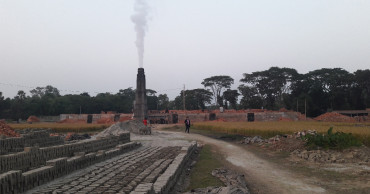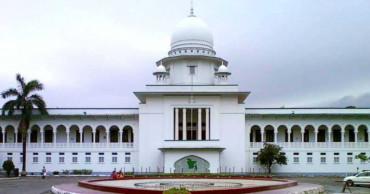Department of Environment (DoE)
Tk 20 crore fines imposed in nationwide anti-pollution drives
Nearly Tk 20 crore fines were imposed and 462 brick kilns were shut down in the Ministry of Environment, Forest, and Climate Change’s nationwide anti-pollution drives.
The nationwide initiative was aimed at tackling pollution through mobile court drives, which were carried out by the Department of Environment from January 2 to March 9, according to a press release on Monday.
14 illegal brick kilns demolished in Savar, Ashulia, and Dhamrai
A total of 598 mobile court operations were conducted during this period, it said.
The drives focused on addressing a range of pollution-related issues, including excessive black smoke from vehicles, illegal polluting brick kilns, steel mills, noise pollution, hazardous waste disposal, lead/battery recycling factories, wetland encroachment, tire pyrolysis plants, charcoal factories, and air pollution caused by construction materials left in open spaces.
Throughout these operations, 1,363 cases were filed, resulting in fines amounting to Tk 19.79 crore. As part of the crackdown on illegal brick kilns, 305 brick kiln chimneys were demolished, leading to the complete shutdown of these operations. Orders were issued for the closure of 157 additional brick kilns, while 60 kilns had their raw bricks destroyed. In another significant move, six trucks containing lead/battery smelting equipment were seized from five factories, which were subsequently shut down, the release said.
Four mobile court drives were conducted in various areas of Dhaka, including Hatirjheel, Moghbazar, Adabor, Aftabnagar, Badda, and Dhanmondi, under the Air Pollution Control Rules 2022 on Sunday. These drives resulted in 11 cases and fines amounting to Tk 60,000. Business owners were issued warnings, and an immediate removal of construction materials was ordered.
In the same vein, a mobile court drive was conducted in Narayanganj against a ready-mix factory under the Solid Waste Management Rules 2021. Three cases were filed, and a fine of Tk 50,000 was collected.
HC orders dismantling of illegal brick kilns nationwide, report due by March 17
Moreover, 20 additional mobile court drives took place across several districts, including Panchagarh, Kurigram, Dinajpur, Nilphamari, Jhenaidah, Bhola, Sirajganj, Meherpur, Moulvibazar, Pirojpur, Gaibandha, Shariatpur, Barguna, Thakurgaon, Bogura, and Sherpur. These drives resulted in 19 cases and fines totaling Tk 13.2 lakh. The operations led to the shutdown of 22 brick kilns, including their demolition and the extinguishing of fires, while three more kilns were ordered to close, added the release.
DoE said these efforts would continue in the future, as part of the ongoing campaign to combat pollution across the country.
11 months ago
Illegal brick kilns: HC summons DoE DG, 5 DCs on contempt of court charge
The High Court on Wednesday summoned deputy commissioners of five districts and Directorate General of Department of Environment (DoE) to appear before it on May 17 for not fully complying with its order to raze illegal brick kilns in Dhaka and its adjacent districts to check air pollution .
The HC bench of Justice Md Ashfaqul Islam and Justice Mohi Uddin Shamim passed the order after hearing a contempt of court petition.
Also read:HC asks govt to pull down 130 illegal brick kilns in CHT
The deputy commissioners summoned are DCs of Dhaka, Narayanganj, Munshiganj, Manikganj and Gazipur districts.
Advocate Manzil Murshid stood for the writ petitioner while deputy attorney general Kazi Mainul Hasan and Advocate Amatul Karim represented the state and the DoE respectively.
Manzil Murshid said the High Court passed a number of orders to prevent air pollution in Dhaka. It also sought a list of illegal brick kilns in Dhaka and its adjacent districts, he said adding 318 brick kilns were found unregistered and the HC asked the authorities concerned to stop operation of those brick kilns.
Recently, a journalist in an investigative report said many brick kilns in Savar are still continuing their operation but the DCs said they had taken steps to stop their operation, said Manzil.
Human Rights and Peace for Bangladesh drew the attention of the court in this regard and filed a writ petition on January 21, 2019.
Also read:Raze all illegal brick kilns in Dhaka & adjoining districts in 15 days: HC
On January 13, 2020, the High Court issued a nine-point order and asked the authorities concerned to implement those.
After taking steps in February, last year, the air pollution reduced remarkably but recently, Dhaka against ranked first in the list of Air Pollution chart of Air Quality Index.
Later, the Human Rights organisation filed a supplementary petition to the High Court for stopping operation of the illegal brick kilns.
3 years ago
Air Quality Index: Dhaka ranks 2nd worst
Dhaka’s air was classified as ‘unhealthy’ as the Bangladesh capital ranked the 2nd worst in Air Quality Index (AQI) Monday morning .
Dhaka’s AQI score was recorded at 186 at 9 am while India’s Delhi and Kolkata occupied the first and the third spots, with AQI scores of 236 and 177, respectively.
An AQI between 201 and 300 is said to be 'poor', while a reading of 301 to 400 is considered 'hazardous', posing serious health risks to residents.
Read: Dhaka’s air remains ‘unhealthy’
AQI, an index for reporting daily air quality, is used by government agencies to inform people how clean or polluted the air of a certain city is, and what associated health effects might be a concern for them.
In Bangladesh, the AQI is based on five criteria pollutants -- Particulate Matter (PM10 and PM2.5), NO2, CO, SO2 and Ozone.
Dhaka has long been grappling with air pollution issues. Its air quality usually turns unhealthy in winter and improves during the monsoon.
A report by the Department of Environment (DoE) and the World Bank in March 2019 pointed out that the three main sources of air pollution in Dhaka "are brick kilns, fumes from vehicles and dust from construction sites".
With the advent of winter, the city’s air quality starts deteriorating sharply due to the massive discharge of pollutant particles from construction work, rundown roads, brick kilns and other sources.
Read: Dhaka’s air quality remains ‘unhealthy’
Air pollution consistently ranks among the top risk factors for death and disability worldwide. Breathing polluted air has long been recognised as increasing a person’s chances of developing a heart disease, chronic respiratory diseases, lung infections and cancer, according to several studies.
As per the World Health Organization (WHO), air pollution kills an estimated seven million people worldwide every year, largely as a result of increased mortality from stroke, heart disease, chronic obstructive pulmonary disease, lung cancer and acute respiratory infections.
3 years ago
7 tanneries shut down in Savar for polluting river
The Department of Environment (DoE) has closed down the operation of seven tanneries at Tannery Industrial Estate in Savar for polluting the Dhaleshwari River by discharging untreated liquid effluents.
The monitoring and enforcement cell of DoE head office and its Dhaka district office jointly conducted an enforcement drive at the Tannery Industrial Estate at Hemayetpur in Savar for discharging untreated liquid wastes, said a press release on Tuesday.
Read: How the ghost of tanneries still haunts Hazaribagh
The water and electricity supplies to the tannery units were cut during the drive , led by executive magistrate Ali Rajib Mahmud Mithun.
4 years ago
Raze all illegal brick kilns in Dhaka & adjoining districts in 15 days: HC
The High Court on Tuesday ordered the demolition of all illegal brick kilns in Dhaka and four other neighbouring districts within 15 days.
The court asked the deputy commissioners of Dhaka, Narayanganj, Munshiganj, Manikganj and Gazipur as well as the director general of the Department of Environment (DoE) to submit an action taken report.
Read:319 illegal brick kilns in Dhaka, 4 surrounding districts, DoE DG reports to HC
A division bench of justices Md Ashfaqul Islam and Md Iqbal Kabir passed the order in the wake of a plea by environmental NGO Human Rights and Peace for Bangladesh (HRPB) seeking directions on the shutting of illegal brick kilns.
“There is no more chance to remain ignorant as environmental pollution has increased at an alarming rate," the judges observed.
The court also questioned the department's efforts in curbing pollution.
On February 16, the department told the court that a total of 319 illegal brick kilns were running in Dhaka and the four neighbouring districts, while 95 had been closed on the orders of mobile courts.
Read: HC seeks lists of illegal brick kilns in Dhaka, 4 other districts
Petitioner’s lawyer Manzil Murshid said that after the High Court ordered the closure of all illegal brick kilns on November 26, 2020, their owners challenged the order. "But the appellate division rejected the appeal."
Following a slew of recent media reports on Dhaka’s deteriorating air quality, the green NGO submitted a supplementary petition.
4 years ago
Dhaka is world’s second-most polluted city
The densely populated capital of Bangladesh continues to gasp for fresh air.
On Thursday, Dhaka was ranked the world's second-most polluted city, as its air quality index (AQI) was recorded at 258 at 9.42am, considered 'poor' or 'very unhealthy'.
Read:Dhaka is world's most polluted city
Russia’s Krasnoyarsk and India’s Delhi occupied the first and third spots, with AQI scores of 290 and 257, respectively, in the list of world cities with the worst air quality.
An AQI between 201 and 300 is said to be 'poor', while a reading of 301 to 400 is considered 'hazardous', posing serious health risks to residents.
AQI, an index for reporting daily air quality, is used by government agencies to inform people how clean or polluted the air of a certain city is, and what associated health effects might be a concern for them.
In Bangladesh, the AQI is based on five criteria pollutants -- Particulate Matter (PM10 and PM2.5), NO2, CO, SO2 and Ozone.
Dhaka has long been grappling with air pollution issues. Its air quality usually turns unhealthy during winter and improves during monsoon.
A report by the Department of Environment (DoE) and the World Bank in March 2019 pointed out that the three main sources of air pollution in Dhaka "are brick kilns, fumes from vehicles and dust from construction sites".
With the advent of winter, the city’s air quality starts deteriorating sharply due to the massive discharge of pollutant particles from construction works, rundown roads, brick kilns and other sources.
Read: Dhaka's air quality is still 'unhealthy'
Air pollution consistently ranks among the top risk factors for death and disability worldwide. Breathing polluted air has long been recognised as increasing a person’s chances of developing heart disease, chronic respiratory diseases, lung infections and cancer, according to several studies.
As per the World Health Organization (WHO), air pollution kills an estimated seven million people worldwide every year, largely as a result of increased mortality from stroke, heart disease, chronic obstructive pulmonary disease, lung cancer and acute respiratory infections.
4 years ago
Dhaka continues to gasp for fresh air
The densely populated capital of Bangladesh continues to gasp for fresh air. In fact, it is still the world's third-most polluted city.
Dhaka'd air quality index (AQI) was recorded at 268 at 10am on Thursday, which is considered "poor" or "very unhealthy".
India’s Delhi and Pakistan’s Lahore occupied the top two spots with AQI scores of 513 and 306, respectively, in the latest list of world cities with the worst air quality.
Read: No respite for Dhaka residents as air quality still ‘unhealthy’
An AQI between 201 and 300 is said to be 'poor', while a reading of 301 to 400 is considered 'hazardous', posing serious health risks to residents.
AQI, an index for reporting daily air quality, is used by government agencies to inform people how clean or polluted the air of a certain city is, and what associated health effects might be a concern for them.
In Bangladesh, the AQI is based on five criteria pollutants -- Particulate Matter (PM10 and PM2.5), NO2, CO, SO2 and Ozone.
Dhaka has long been grappling with air pollution issues. Its air quality usually turns unhealthy during winter and improves during monsoon.
A report by the Department of Environment (DoE) and the World Bank in March 2019 pointed out that the three main sources of air pollution in Dhaka "are brick kilns, fumes from vehicles and dust from construction sites".
Read:Dhaka breathes ‘unhealthy’ air as AQI dips
With the advent of winter, the city’s air quality starts deteriorating sharply due to the massive discharge of pollutant particles from construction works, rundown roads, brick kilns and other sources.
Air pollution consistently ranks among the top risk factors for death and disability worldwide. Breathing polluted air has long been recognised as increasing a person’s chances of developing heart disease, chronic respiratory diseases, lung infections and cancer, according to several studies.
As per the World Health Organization (WHO), air pollution kills an estimated seven million people worldwide every year, largely as a result of increased mortality from stroke, heart disease, chronic obstructive pulmonary disease, lung cancer and acute respiratory infections.
4 years ago
Arabian Corporation fined Tk 10 lakh for cutting hills in Chattogram
The Department of Environment (DoE) has fined Arabian Corporation Tk10 lakh for cutting 20,000 cubic feet of a hill at GEC in Khulshi area of Chattogram city.
Nurullah Nuri, director of DoE Chattogram office, imposed the fine after a hearing at the office on Sunday.
Read: Eviction begins on Chattogram hills to save lives during landslides
He said that the inspection team of the DoE found evidence of cutting 20,000 cubic feet of a hill visiting GEC area on December 17.
Arabian Corporation owner Md Nur Islam and his wife Amena Begum were fined Tk 10 lakh for causing damage to the environment by cutting hill. The couple was present during the hearing session.
DoE received Tk 5 lakh of the fine during the session while the court ordered the owner of Arabian Corporation to pay the remaining money by Monday.
4 years ago
Magura brick kilns fined Tk 12.9 lakh
A mobile court on Wednesday fined 18 brick kilns Tk 12.9 lakh in the Sadar upazila.
6 years ago
Appoint five executive magistrates for DoE: HC
The High Court on Sunday directed the Public Administration Ministry to appoint five executive magistrates for the Department of Environment (DoE) within one month for conducting mobile courts.
6 years ago

.jpg)
.jpg)










